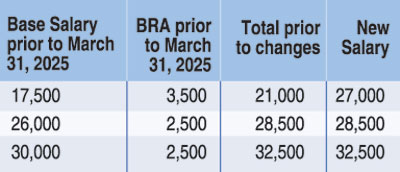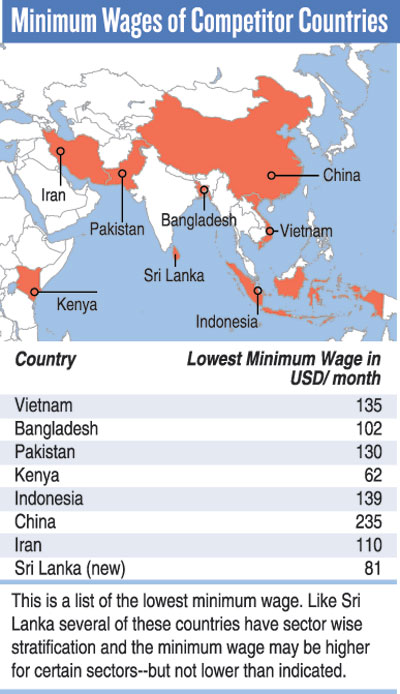News
Minimum wage being raised, but legal tussle over monthly allowance
View(s):By Mimi Alphonsus
The national minimum wage is to be increased from Rs. 21,000 to Rs. 27,000 a month next week through amendments to existing legislation. However, the move has proved controversial as it includes the termination of the budgetary relief allowance (BRA), a key component of workers wages for decades.
Unions are advocating for the BRA to remain intact. The commercial and industrial workers union has filed a submission against its repeal in the Supreme Court.
The minimum wage is determined through two structures: the National Minimum Wage of Workers Act No. 3 of 2016 and the Budgetary Relief Allowance Acts (2005 and 2016). As per these laws, an employer must pay their employee at least Rs. 17,500 base salary monthly. On top of that, all workers earning below Rs. 40,000 must be paid Rs. 2,500 as BRA while a worker earning below Rs. 20,000 must be paid an additional Rs. 1,000.

In sum, the legal minimum wage in Sri Lanka has been Rs. 21,000 per month. For daily wage workers Rs. 700 is the minimum daily pay with an additional sum as BRA if the worker earns below Rs. 1,600.
The new regulations increase the base salary to Rs. 27,000 for monthly earners and Rs. 1,080 per day for daily wage earners by amending the National Minimum Wage of Workers Act. The amendments also schedule an increase to Rs. 30,000 for monthly earners and Rs. 1,200 for daily wage earners in January 2026.
Along with the increases the new regulations also terminate the BRA Acts.
However, clauses are in place mandating that employers consolidate the former BRA payments into the base salary for those who were receiving BRA payments as at March 31, 2025. This is to ensure that the Rs. 27,000 to Rs. 40,000 category of workers do not effectively suffer a wage cut by losing the BRA.
Chairman of the Joint Apparel Association Federation, Yohan Lawrence explained how the industry would implement the changes. “If your base salary is Rs. 30,000 your earlier pay slip will show Rs. 30,000 + Rs. 2,500 for BRA. Now it will just say Rs. 32,500,” he said.
 Mr. Lawrence said that apparel employers will not be re-drafting contracts to reflect the new wages and it will merely be reflected in the pay slip.
Mr. Lawrence said that apparel employers will not be re-drafting contracts to reflect the new wages and it will merely be reflected in the pay slip.
Unions are worried about the implementation. They warn that employers will take advantage of the repeal of the BRA acts to reduce take-home wages. In their submission to the court, the Commercial and Industrial Workers Union argued that the Department of Labour will not have “any means of inspecting whether the employer has in fact consolidated the BRA payments into the wage structure.”
“The BRA acts require that employers keep a separate registry on those payments so we can check that they are actually paying,” said Swasthika Arulingam, president of the Commercial and Industrial Workers Union. “But now it will be much easier for employers to pay the old base salary without increasing it to incorporate the old BRA.”
The Ministry of Labour and Department of Labour did not respond for comment.
The battle on the BRA is likely to come to head on Monday when the Supreme Court is expected to announce its decision to Parliament. Depending on the decision, these amendments are scheduled to be taken up in Parliament next week.
| Minimum wage does not factor cost of livingThe controversy around the changes have renewed conversations on minimum wage laws in Sri Lanka. Until now Sri Lanka had the lowest national minimum wage of all South Asian countries (except India where it is determined at the state level). With this increase, Sri Lanka will surpass Afghanistan and Bhutan but remain lower than all other South Asian countries and among the lowest in the world.Countries have different minimum wage systems, some differentiating by sector and others not; some enforcing wages by the hour, others by day, month or year. Some do not have a minimum at all, relying instead on collective bargaining. Differences also exist in how regularly minimum wages are adjusted with some countries doing so every six months and others only every few years. The International Labour Organization encourages countries to consider an evidence-based approach when adjusting the minimum wage and to consider the needs of workers and families as well as economic conditions. In this most recent adjustment, unions and employers have raised issues with the procedure.“There was no scientific method to decide on the wage and it is done in an ad hoc manner,” said Mr. Lawrence. “If we know at least the timing of increases we can plan accordingly but they are being often and at random.” Sri Lanka increased the minimum wage from Rs. 12,500 to Rs. 17,500 in September 2024. Mr. Lawrence believes that the new increase this year, coupled with higher electricity costs, will erode Sri Lanka’s competitiveness internationally. Smaller factories, he explained, are most likely to be affected as are non export industries like private security companies and janitorial services. “The Department of Census and Statistics shows that a family needs Rs. 60,000 to survive so a minimum wage of Rs. 27,000 is unacceptable,” said Anton Marcus, general secretary of the Free Trade Zones & General Services Employees Union. “The minimum wage should be a living wage otherwise there is no point.” He criticised sector based stratification arguing that it is unfair for the national minimum wage — which effectively only affects the private sector — to be much lower than that in the public sector or plantation sector. Currently the public sector minimum wage is just over Rs. 30,000 with increases scheduled for 2026 and 2027. On the plantations it is Rs. 1,350 per day. But for domestic workers even the national minimum wage is not applicable. The Minimum Wage of Workers Act explicitly excludes them stating in its definition of ‘worker’ that it “does not include a domestic servant’’. Kalpa Madhuranga of Protect Union, which represents domestic workers, has raised the issue with multiple ministers of labour with no luck. “This government has a two thirds majority but they still haven’t fixed this simple, unfair exclusion,” he said. | |
The best way to say that you found the home of your dreams is by finding it on Hitad.lk. We have listings for apartments for sale or rent in Sri Lanka, no matter what locale you're looking for! Whether you live in Colombo, Galle, Kandy, Matara, Jaffna and more - we've got them all!

